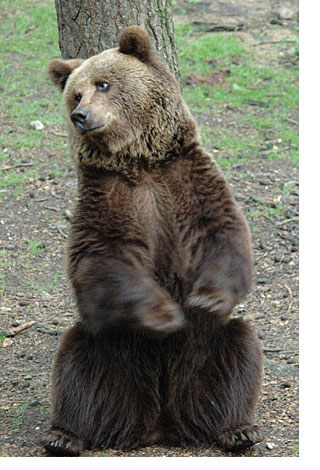Holland: Reintroducing Bears into the Wild
Globally, there exist between six and eight distinct species of brown bear. The number varies because of the conspicuous variations in Alaskan populations. The approximately 50,000 remaining wild Brown Bears in Europe are distributed throughout ten wild populations, mostly in Russia, although 15,000 of them are in Eastern Europe, a few still roaming throughout the Alps in France and Italy, even into northwestern Greece. But the animals are at high risk, their numbers declining rapidly.
 Fortunately, bears have many human friends in Europe and Russia. One such individual, Professor Pazhetnov, has raised 70 bear cubs and successfully released them into protected Russian sanctuaries that had few, if any remaining wild bears.
Fortunately, bears have many human friends in Europe and Russia. One such individual, Professor Pazhetnov, has raised 70 bear cubs and successfully released them into protected Russian sanctuaries that had few, if any remaining wild bears.
Moreover, since 1982, the Brown Bear has been legally protected in Appendix II of the Bern Convention on the Conservation of European Wildlife and natural Habitats, signed by 40 member states throughout the European Community. In Holland, where no known bears remain in the wild, Koen Cuyten, Project Coordinator and Head of Welfare for Alertis, part of the Dutch Fund for Bear and Nature Conservation, is working with colleagues in Georgia to change that situation. Alertis has managed to embrace compassion-in-action through the difficult conservation work involving captive management in a wild setting that adjoins some of the most densely populated human areas in Europe. Established in 1993, this Dutch Bear Sanctuary was able to mobilize Dutch support to rescue three bears from a bankrupt zoo in Georgia. The animals were going to be euthanized for lack of civil funding to take care of them. In April 2007, the bears arrived in Holland and were released into their new safe haven, along with several other previously rescued Brown Bears. At Alertis, for the first time in their lives, says Koen, “they could stand on grass, swim in a large pond, play with other bears, climb trees, and go into hibernation like other bears do.”
DSF was honored to be able to come photograph the bears at Alertis and to feature Alertis’ remarkable efforts in the book Sanctuary at a time when the Dutch are struggling to enact the expansion of natural habitat in their small country (from approximately 1.66 million acres in 2007 to 1.8 million acres by 2018.) If achieved, that would put nearly 20% of the country back into a natural or semi-natural condition and hopefully relieve the ecological pressures that have to date resulted in 29% of all known in situ biodiversity being threatened with extinction across the Netherlands.
Holland is also one of the countries profiled in “No Vacancy” in which sociologists, demographers and health experts describe how the Netherlands has championed women’s rights, being one of the co-initiators in the late 1960s of the United Nations Population Fund (UNFPA) and remaining one of its strongest supporters.
For more information:
> Alertis: Fund for Bear and Nature Conservation
